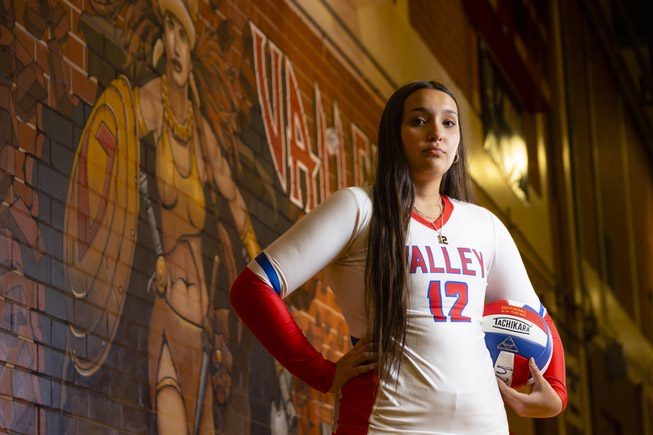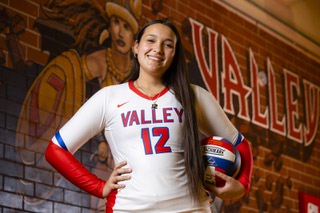
Volleyball player Taela Elliot poses for a photo at Valley High School Monday, Nov. 14, 2022.
Saturday, Nov. 19, 2022 | 2 a.m.
Volleyball is taking Taela Elliott from Valley High School to college on a full-ride scholarship, but basketball was her first love. She grew up in Northern Nevada, playing rez ball, an aggressive, rapid-fire iteration of basketball that Native Americans have honed into a cultural force.
Only 0.33% of students in Clark County Schools identify as Native American, like Elliott does, according to state enrollment data. But that’s still about 1,000 students, and Elliott hopes that as a University of the Southwest Mustang, she can be a positive example for her peers — just as Shoni Schimmel, a WNBA player who grew up on the Umatilla Indian Reservation in Oregon, was for her.
“We don’t have that much recognition,” she said this week after signing her commitment letter to Southwest, a private college in Hobbs, N.M. “It’s a big deal when a Native kid goes on.”
A member of the Wells Band of the Te-Moak Tribe of the Western Shoshone, Elliott moved in eighth grade from Reno — where she had a group of friends from the Shoshone, Paiute and Washoe tribes — to Las Vegas, where the Native American population is more dispersed in the much larger, more urbanized metro area.
Her classmates here didn’t think Native Americans still existed.
“They told me I’m lying, that Natives were extinct,” Elliott said.
It confused her more than it did hurt her, she said. And through resourcefulness and determination, she’s moving onward and upward.
“I feel like when you have Native role models, it’s easier to see yourself in it,” she said.
As fond as she remains of basketball, volleyball punched her ticket, and here’s why: As a senior setter and right-side hitter this fall for the Vikings, she made the state, division and league leaderboards in blocks (13th overall in the state and third in Class 4A with 83 blocks). She also led Valley in blocks along with hitting percentage (.202) and assists (162), and was second on the team in kills (62) and kills per set (1.2).
Off the court, she’s in the top 10% of her class and only needs one more class to graduate. But to stay eligible for sports, she takes a full schedule, choosing dual credit courses that she can apply to her high school and college transcripts. When she graduates from Valley this spring, she’ll have almost two years’ worth of transferable college credits.
Although the COVID-19 pandemic and a major shoulder injury combined to limit her high school career mostly to her freshman and senior years, and modest means meant she had little opportunity to play on private club teams, Elliott shopped around a highlight reel this year to coaches through a recruiting app.
She found several takers for her volleyball skills, including three full-ride offers: Southwest, Haskell Indian Nations University in Kansas and Rockford University in Illinois.
Elliott said she chose Southwest because she preferred the coaching style of the volleyball staff and because the school offered a sports psychology major. She said the pandemic and her injuries affected her mental health, and she can take what she learned to help other Native Americans.
Her mom, Tarina Elliott, is also her coach at Valley. A longtime volleyball player who played for Lassen Community College in Northern California after growing up on Shoshone land outside of Elko, Tarina Elliott said she never pushed her sport on her eldest child. Taela Elliott said she decided to try it out when she got to high school because her mom coached the girls and boys’ teams, and, after other coaches evaluated her raw skills, she immediately made varsity and grew in her love for her second sport.
Taela Elliott said she was raised in the Shoshone tradition, and she can speak some of the language — only a couple of thousand people do, according to the annual reference publication Ethnologue. She’s also on the youth council for the Nevada Native Caucus, and is a jingle dancer, performing a traditional, sacred dance that sends prayers for healing. For Native American Heritage Month this month, she demonstrated her dance for students at Las Vegas High School and Bridger Middle School.
What she doesn’t say, but her mom does, is that she has earned money dancing at powwows, and that she understands more of the Shoshone language than just a few words.
Taela isn’t one to brag, her mother said.
Or complain.
At 5-foot-10, she’s relatively short for college volleyball. She adapted to the sport by learning how to set in addition to being a right hitter.
Tarina Elliott, who is raising her three kids as a single mom, works three jobs to support her family. So when Taela wanted to make a recruiting trip, or buy brand-name sneakers, she chipped in with the money she earned herself at her job at a clothing store inside Fashion Show mall.
Taela dislocated her shoulder during a match freshman year, but played it down until her junior year, when the2-year-old injury returned with a vengeance, and she tore the muscles around her armpit. The injury sent her to the surgeon and ended her season just as it began. And early in her senior season, she injured her ankle at practice. Unwilling to lose another year, she taped it and played on.
Most scholarships go to girls who could afford to play on club teams, she said. Because she couldn’t, she found a few local leagues and volleyball tournaments on reservations to fill in gaps. When schools were on remote learning and sports were canceled in 2020 and 2021, she kept active by peppering an outside wall at her house with a volleyball — and hopping fences with friends to access locked outdoor basketball courts.
Taela Elliott expects to earn her bachelor’s degree early but can continue to play as a graduate student — and she still looks at Southwest’s basketball program too.
“I’ve always wanted to be the best,” she said. “I’m supercompetitive.”

